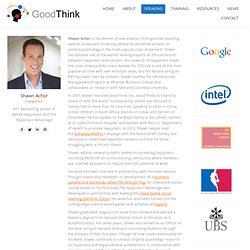

The Benefits of Optimism Are Real - Emily Esfahani Smith. Heart rates rapidly increased.

Arteries constricted. Blood pressure shot up. Then, participants were shown a short video clip that either evoked negative emotions (like sadness), positive emotions (like happiness), or a neutral condition of no emotions. The participants were also told that if they were shown a video clip "by chance" that they were off the hook: They did not have to give the speech after all. That meant that their anxiety would start to subside as the video clips started. Here was the interesting finding: The heart activity of the participants who viewed the positive clips returned to normal much quicker than their peers who were shown the negative or neutral clips. Shawn Achor. Shawn Achor is the winner of over a dozen distinguished teaching awards at Harvard University, where he delivered lectures on positive psychology in the most popular class at Harvard.

Shawn has become one of the world’s leading experts on the connection between happiness and success. His research on happiness made the cover ofHarvard Business Review, his TED talk is one of the most popular all time with over 4 million views, and his lecture airing on PBS has been seen by millions. Shawn teaches for the Advanced Management Program at Wharton Business School, and collaborates on research with Yale and Columbia University. In 2007, Shawn founded GoodThink, Inc. (GoodThink) to share his research with the world. Shawn advises several projects related to spreading happiness, including BetterUP, an online training community where members are coached by experts to realize their full potential at work.
Jonathan Haidt on the moral roots of liberals and conservatives. Peter Diamandis: Abundance is our future.
Shawn Achor: The happy secret to better work. Tali Sharot: The optimism bias. Un optimisme qui nous sauvera ! L'optimisme semble s'installer à tous niveaux de la société, excepté au sommet, tentant de combattre un pessimisme de rigueur.

La Grèce en faillite, la note de l’Italie abaissée, les bourses mondiales qui jouent au Yoyo, le plan Fillon, etc… pas étonnant que le dernier baromètre BVA-BFM-Challenges-Avanquest, publié en ce début de mois, enregistre un pessimisme record depuis la crise de 2008. Ainsi, en ces temps où « morosité » devient le maitre mot et fait la une de tous les médias, juste derrière celui de « rigueur », une tendance semble paradoxalement émerger. Une tendance, enfin pas exactement ; il s’agit davantage d’un état d’esprit, voire pour certains d’un art de vivre, qui anime constamment certaines personnes et n’habitera probablement jamais d’autres. Le fait est que ces dernier temps, cet état d’esprit peut réellement faire du bien. Florilège de citations - "On ne peut rien enseigner à autrui. On ne peut que l'aider à le découvrir lui-même" (Galilée.
Conference Eloge de l'optimisme - Philippe Gabilliet - une vidéo Vie pratique. Jeremy Rifkin Nucléaire France. Nancy Etcoff on the surprising science of happiness. Dave Meslin: The antidote to apathy. Martin Seligman on positive psychology. Dan Gilbert asks, Why are we happy? Randy Pausch: Really achieving your childhood dreams. Happiness Formula.
Sonja Lyubomirsky. Sonja Lyubomirsky is a professor in the Department of Psychology at the University of California, Riverside and author of The How of Happiness, a book of strategies backed by scientific research that can be used to increase happiness.[1] She is often quoted in news articles about positive psychology and happiness.[2][3][4] In the book The Only Self-Help Book You'll Ever Need, a criticism of self-help books, Lyubomirsky's The How of Happiness is praised as a self-help book that has claims backed by empirical data.[5] Lyubomirsky is also an associate editor of the Journal of Positive Psychology.

The How of Happiness[edit] Breakdown of sources of happiness, according to The How of Happiness The How of Happiness has spawned an iPhone application called Live Happy, produced by Signal Patterns. The How of Happiness has also spawned a song called The How of Happiness Book Tune, which acts as a mnemonic aid to help readers remember the content within the book. [11] References[edit] To predict what will make you happy, ask a stranger rather than guessing yourself. Want to know how much you’d enjoy an experience?

You’re better off asking someone who has been through it, even if they’re a complete stranger, than to find out information for yourself. This advice comes from Daniel Gilbert from Harvard University, who espoused it in his superb book Stumbling on Happiness. Now, he has found new support for the idea by studying speed-daters and people receiving feedback from their peers. In the first study, he found that female students were better able to predict how much they would enjoy a speed-date if they listened to the experiences of strangers than if they make their own assessments based on available information. Likewise, the second study found that people more accurately foresaw their reactions to criticism when they knew how someone else had reacted than when they had the information for themselves.